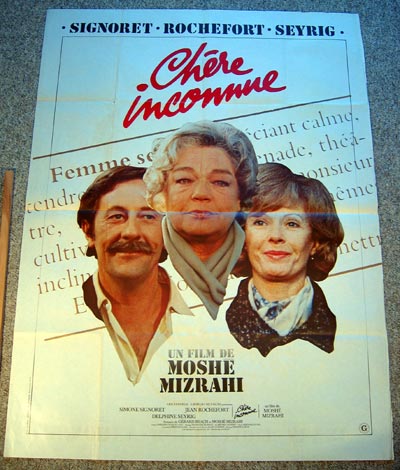
I SENT A LETTER TO MY LOVE (CHERE INCONNUE)
France, 1981 102 minutes, Colour.
Simone Signoret, Jean Rochefort, Delphine Seyrig.
Directed by Moshe Mizrahi.
I Sent A Letter To My Love (Chere Inconnue) is an attractive romantic French film. The director is Moshe Mizrahi, writer-director of the successful Simone Signoret vehicle and Oscar-winner, Madam Rosa. This is also a Signoret vehicle and in her ageing she shows dramatic skills and sympathetic presence on screen. She is joined by excellent actor Jean Rochefort (Pardon Mon Affair etc.) and Delphine Seyrig, star of Last Year at Marienbad and Muriel. The screenplay was co-written by Gerard Brach, Roman Polanski's frequent collaborator, especially with Tess. Photography is by Ghislaine Cloquet, who photographed Tess after Geoffrey Unsworth's death. The setting is similar - and Normandy, around Brest, is most beautifully photographed.
The focus is on middle age. The triangle is unusual - an elderly sister looking after her brother and by accident starting a pen friend exchange with him, unbeknown to him. The neighbour, a prim baker's daughter, is in love with the brother. The film moves gently, focusing on the emotional responses of each of the characters, comes to a bittersweet and inevitable ending. The film explores the emotional needs of ageing people who have not had opportunity - who have given their lives for others or who are disabled. On paper, much of the material sounds trite. However, in the hands of the director and the stars it becomes a touching film of romantic melancholy. The film is based on an English novel, I Sent A Letter To My Love.
1. The focus of the title, audience expectations, romance? The unusual twists to the romantic expectations, irony?
2. The quality of French film-making and the tone given to romance, relationships, melancholy? The contribution of the colour photography of Normandy? The emphasis on water, the beach, cliffs? The house on the cliffs? The town? The emphasis on natural beauty? The piano score (played by Roger Woodward)?
3. The strength of the cast and their reputations and skills? Giving quality to the conventional material?
4. How well did the film establish the characters and tone? The loving relationship between Louise and Gilles, the immediate raising of tensions around the house, Louise and the voice-over thoughts about killing her brother? The giving up of live to care for an invalid? Tantrums in the house? The quality of the care? Louise's fussiness? The gradual revelation of the story about their lives? The quality of the bonds between them? The film's early attention to household detail to establish the characters and relationship?
5. The introduction of Yvette: bringing the bread, her primness of manner, her attitude towards sexuality and tension, her quoting of the newspapers for sensational incidents? The revelation of the friendship at school - and her attitude towards sex education? Her happiness in being in the household, brother and sister teasing her? The number of visits and the recurring breakfasts? The importance of the merry-go-round sequence? Yvette and her buying the slacks, splitting them, the happiness of the picnic, her fondness for Gilles? Her continuing to take him for walks along the beach? The inevitability of their engagement? The transformation of Yvette?
6. The portrait of Louise: her age, appearance, her calling herself a spinster, Gilles getting on her nerves, her fussiness, attention to detail, preparing food, her reading the newspapers and writing to the penfriends column? Her anxiety about receiving the letters, the irony of discovering that Gilles had written to her under her nom-de-plume?
7. Her motives for carrying on the correspondence? The effect on her emotions, her devices for getting the letters to Gilles, the visits-to the post office and her identification, watching the other people especially Mrs. Thomas waiting for the letter which never came, the cruel trick of the blank piece of paper? Her devices for covering up the situation? The importance of her going to the theatre, persuading Elizabeth to pretend she was Beatrice, the elaborate set-up for the visit, the ugliness of the aftermath?
8. The character of Gilles - his being a cripple, his tantrums, ill-health, the merry-go-round sequence and his illness, his dislike of the doctor, the irony that he had written the letters, his covering up, explanations to Louise, the build-up to the visit, the sexual aggression and the aftermath?
9. The voice-over devices for the reading of the letters - the tone of voice, the visuals explaining or at counterpoint to the contents of the letters? The irony of Louise knowing and Gilles: not knowing?
10. Gilles' not writing after the encounter with Beatrice? Louise's desperation? Her contriving the death of B6atrice's mother? The letter of rejection by Gilles? The announcement of the engagement and Louise's reaction, letting Beatrice's name slip, the worry for Yvette, Yvette’s brother and smoothing over the situation? Gilles willing to tell the story?
11. Louise burning the letters and keeping Gilles’ photo? Gilles' discovery of the truth? The ensuing marriage sequence and Gilles looking at his sister? Her nodding her consent? How much did Gilles know, what did Louise realise about Gilles' knowledge?
12. Themes of love and interrelationships, dependence? Emotional needs and emptiness, sensitivity? The background of an incestuous relationship and the sensitive way this was portrayed? Insight into emotions?
13. What was the audience left with - the empathy with the characters. moral decisions, emotional stress, happiness?